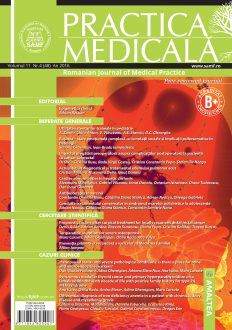SELECT ISSUE

Indexed

| |

|
|
|
| |
|
|
|

|
|
|
|
|
|
|
HIGHLIGHTS
National Awards “Science and Research”
NEW! RJMP has announced the annually National Award for "Science and Research" for the best scientific articles published throughout the year in the official journal.
Read the Recommendations for the Conduct, Reporting, Editing, and Publication of Scholarly work in Medical Journals.
The published medical research literature is a global public good. Medical journal editors have a social responsibility to promote global health by publishing, whenever possible, research that furthers health worldwide.
Prognostic factors after surgical treatment for locally recurrent distal rectal cancer
Denis ASLAN, Adrian BORDEA, Razvan SCAUNASU, Ileana POPA, Cristian BALALAU and Traean BURCOS
ABSTRACT
Objectives. Local recurrence after distal rectal cancer surgery is a major complication with an increased morbidity and mortality. The therapeutic strategy consists in a complex association of radiochemotherapy
with surgical approach that may improve prognosis and quality of life. It is necessary to identify the risk factors for local recurrence and to have a highly-selected patients for oncological radical treatment.
Materials and methods. The study included the analysis of 79 patients with middle and lower rectal cancer who were diagnosed and operated at Coltea Clinic Surgical Clinic Hospital, Bucharest, for a period of
4 years. Male patients were more frequent (64.4%). The average age was 65 years old. The surgical strategy included 33 patients (41.8%) who underwent abdominoperineal resection, 36 patients (45.6%) who underwent low anterior resection with stapled colorectal anastomosis and 10 patients (12.75) who underwent ultralow anterior resection.
Results. Local recurrence rate was 12.7%. The mean time from surgery until the time of discovery of local recurrence was 14.5 months. Local recurrence was associated with advanced tumor stages T3 (10.1%) and T4 (2.5%). It was also associated with histopathological features related to serous infiltration (100%) and tumor invasion of the radial margins (3.8%). The surgical treatment strategy consisted of abdominoperineal resection, permanent colostoma and R2 resections.
Discussion. The radical surgical resection is the most significant prognostic factor. There are a number of other patient-related factors and tumor-related factors that can significantly influence the evolution and overlall survival. Periodic clinical, imaging scans and colonoscopy follow-ups are able to early detect the tumor recurrence and to allow a curative cancer treatment.
Conclusions. Local recurrence after mid and lower rectal cancer surgery is a major complication with direct impact on morbidity, mortality, prognosis and quality of life of these patients. The treatment strategy
must be established by a multidisciplinary team in order to identify carefully-selected patients to undergo the optimal oncological therapy.
Keywords: rectal cancer, local recurrence, risk factors
Full text | PDF
